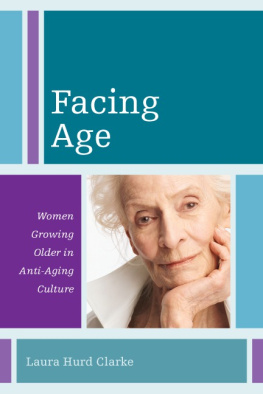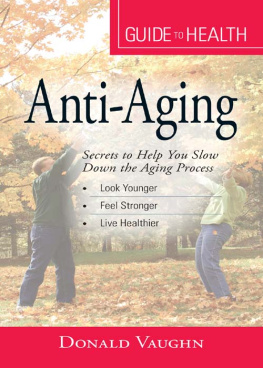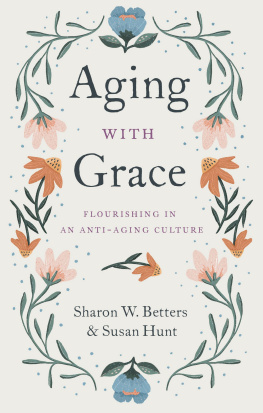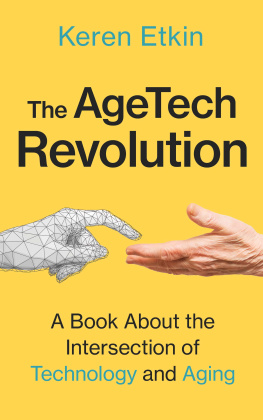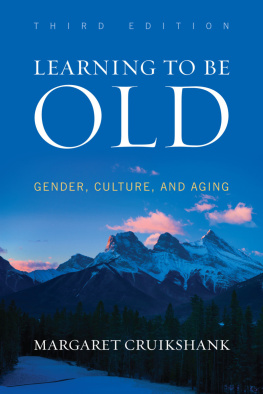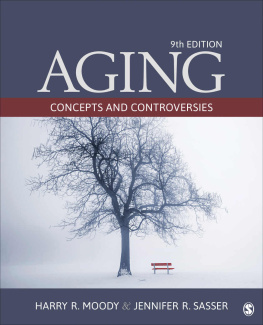Hurd Clarke - Facing age: women growing older in an anti-aging culture
Here you can read online Hurd Clarke - Facing age: women growing older in an anti-aging culture full text of the book (entire story) in english for free. Download pdf and epub, get meaning, cover and reviews about this ebook. City: Lanham;Md, year: 2010, publisher: Rowman & Littlefield Publishing Group, Inc., genre: Science. Description of the work, (preface) as well as reviews are available. Best literature library LitArk.com created for fans of good reading and offers a wide selection of genres:
Romance novel
Science fiction
Adventure
Detective
Science
History
Home and family
Prose
Art
Politics
Computer
Non-fiction
Religion
Business
Children
Humor
Choose a favorite category and find really read worthwhile books. Enjoy immersion in the world of imagination, feel the emotions of the characters or learn something new for yourself, make an fascinating discovery.
- Book:Facing age: women growing older in an anti-aging culture
- Author:
- Publisher:Rowman & Littlefield Publishing Group, Inc.
- Genre:
- Year:2010
- City:Lanham;Md
- Rating:3 / 5
- Favourites:Add to favourites
- Your mark:
- 60
- 1
- 2
- 3
- 4
- 5
Facing age: women growing older in an anti-aging culture: summary, description and annotation
We offer to read an annotation, description, summary or preface (depends on what the author of the book "Facing age: women growing older in an anti-aging culture" wrote himself). If you haven't found the necessary information about the book — write in the comments, we will try to find it.
Hurd Clarke: author's other books
Who wrote Facing age: women growing older in an anti-aging culture? Find out the surname, the name of the author of the book and a list of all author's works by series.
Facing age: women growing older in an anti-aging culture — read online for free the complete book (whole text) full work
Below is the text of the book, divided by pages. System saving the place of the last page read, allows you to conveniently read the book "Facing age: women growing older in an anti-aging culture" online for free, without having to search again every time where you left off. Put a bookmark, and you can go to the page where you finished reading at any time.
Font size:
Interval:
Bookmark:
Facing Age
Diversity and Aging
Series Editor
Toni Calasanti
Virginia Tech
The elder population is not only growing in size, but also becoming more diverseincluding differences in gender, race, ethnicity, class, and sexualityand the experiences of aging people can vary dramatically. Books in this series explore this diversity, focusing on the ways that these social inequalities, along with ageism, shape experiences of growing old. The series will illustrate the challenges and opportunities that diversity and aging present for society, both now and in the future.
Facing Age: Women Growing Older in Anti-Aging Culture
Laura Hurd Clarke
Facing Age
Women Growing Older
in Anti-Aging Culture
Laura Hurd Clarke
Published by Rowman & Littlefield Publishers, Inc.
A wholly owned subsidiary of The Rowman & Littlefield Publishing Group, Inc.
4501 Forbes Boulevard, Suite 200, Lanham, Maryland 20706
http://www.rowmanlittlefield.com
Estover Road, Plymouth PL6 7PY, United Kingdom
Copyright 2011 by Rowman & Littlefield Publishers, Inc.
All rights reserved. No part of this book may be reproduced in any form or by any electronic or mechanical means, including information storage and retrieval systems, without written permission from the publisher, except by a reviewer who may quote passages in a review.
British Library Cataloguing in Publication Information Available
Library of Congress Cataloging-in-Publication Data
Clarke, Laura Hurd, 1969
Facing age : women growing older in anti-aging culture / Laura Hurd Clarke.
p. cm. (Diversity and aging)
Includes bibliographical references and index.
ISBN 978-1-4422-0759-2 (cloth : alk. paper) ISBN 978-1-4422-0760-8 (pbk. : alk. paper) ISBN 978-1-4422-0761-5 (electronic)
1. Beauty, Personal. 2. Middle-aged womenPsychology. 3. AgingPsychological aspects. 4. Middle-aged womenPhysiological aspects. 5. Feminine beauty (Aesthetics) 6. Self-esteem in women. I. Title.
HQ1219.C53 2011
306.4613dc22 2010023866
` The paper used in this publication meets the minimum requirements of American National Standard for Information SciencesPermanence of Paper
for Printed Library Materials, ANSI/NISO Z39.48-1992.
Printed in the United States of America
To Ayden and Alyssa, with all my love.
This book would not have happened if Toni Calasanti had not afforded me the opportunity, encouragement, and mentorship required to bring it to fruition. I am truly grateful and have learned more than I could have imagined through this process. Thank you.
This book would also not have happened without the undying patience and love of my husband, Darryl, the enthusiastic cheerleading of my dearest friend, Tricia, the sage advice of my colleagues at the University of British Columbia, the assistance of people like Alexandra Korotchenko, Andrea Bundon, and Meridith Griffin, or the inspiration of my parents and grandparents. To all of you, I extend my deepest and most heartfelt appreciation.
Finally, I am entirely indebted to all of the women who have participated in my research and who have given so generously of their time over the past 10 years. Your willingness to share your stories, strength, and pain has changed my life forever.
S
You are only as old as you look. You can control how you age. Inner beauty is important but not nearly as important as outer beauty. Keep them guessing about your age.
Heightening anxiety and ambivalence about the physical realities of growing older and the concomitant loss of social currency, these types of statements can be found in advertisements, beauty columns, talk shows, Internet websites, Hollywood movies, television programs about cosmetic surgery or fashion makeovers, and motivational posters in fitness gyms. Even the emergence of the Dove Campaign for Real Beauty, with its co-opting of feminist critiques and use of alternative and supposedly resistant images of feminine attractiveness, albeit for the sake of blatantly promoting consumption, has done little to wrest the hold that restrictive appearance ideals for women have on Western society (Dye, 2009; Johnston & Taylor, 2008). Underlying these messages is an increasingly unobtainable beauty standard for women, which is epitomized by a young, thin, toned, healthy, White, suntanned body with flawless and wrinkle-free skin, perfectly coiffed hair, little or no body hair, artfully applied makeup, and the latest fashionable trappings. Approximation to this beauty ideal is one of the primary ways by which women are afforded social value (Bartky, 1998; Bordo, 2003; Brown & Jasper, 1993; Cepanec & Payne, 2000; Dworkin, 1974; Hesse-Biber, 1996; Jeffreys, 2005; Wolf, 1991). Thus, aging poses a huge threat to womens sense of identity, perceived femininity, and sexual desirability. However, Seid (1989) has argued that [a]ge is an enemy of beauty, but it need not be. If we discipline ourselves... we, too, will preserve the source of our beauty, a youthful body (p. 17). Consequently, Holstein (2006) contends that ironically, after years of struggle, as women have achieved a stronger status as agents than ever before, we face an escalating set of expectations about our bodies (p. 320). Indeed, the scope of beauty work, which Kwan and Trautner (2009) define as specific appearance and beauty practices performed on oneself... to elicit certain benefits within a specific social hierarchy (p. 50), continues to expand with the development of more and more beauty products and services as well as the relentless mining of the female body for potential flaws in need of beauty interventions. Reflecting the societal obsession with youthfulness and appearance, ageist media messages depict later life and signs of aging as the products of objectionable, or at the very least indolent, choices that individuals make when they fail to embrace consumerism and the anti-aging movement. Moreover, assumptions about the importance of anti-aging technologies and practices have become unquestioningly entrenched such that there is relatively little critical examination of aging bodies, ageism, and older adults experiences of oppression within an anti-aging culture.
Despite the ubiquity of anti-aging ideologies and the deep-seated ageist bigotry that underlies contemporary Western society, ageism in all of its manifestations remains undertheorized and underresearched within the sociocultural literature. The disinterest in theorizing and researching age relations partly stems from the privilege of the young who only begin to recognize the power of ageist discourses and discrimination when they themselves become old (Calasanti & Slevin, 2001). In other words, most people choose to ignore or fail to see ageism in society until they are personally touched by the social and physical realities of growing older. Ironically, our disregard of ageism is ultimately to our own detriment since this form of oppression is the one source of disadvantage that we will all face, should we live long enough (Calasanti, 2005, p. 8). However, we remain largely unaware of or unwilling to challenge the implications of both our subtle and overt internalization of ageist discourses because conformity to specific norms is required to achieve certain social ends (Holstein, 2006). The taken-for-granted discriminatory discourses and practices surrounding oldness combined with the scholarly silences around aging and aged bodies culminate in our authoring of our own descent into social devaluation. For as Calasanti (2005) aptly states: We ultimately oppress ourselves: Either we try to avoid the aging process or we lose self-esteem because of the selves we feel we are becoming (p. 8).
This is not to say that the extant research has completely ignored ageism and the ways that age-based discrimination delimits the lives of older individuals. Sociocultural analyses of ageism have yielded profound insights into the structural inequities that precede and emanate from mandatory retirement policies, negative attitudes toward older workers, lack of access to health care and appropriate caregiving resources, and elder abuse. Seminal works such as those by Arber and Ginn (1991a), Bytheway (1995), Calasanti & Slevin (2001), Cruikshank (2003), Featherstone & Wernick (1995), Furman (1997), Gullette (2004), and Woodward (1999b) have signified influential strides in critical and feminist theorizing about the gendering of later life and the impact and experience of ageism. However, with the exception of Furmans (1997) ethnography of older women and beauty shop culture and the recent scholarship of Brooks (2010) and Kinnunen (2010), the centrality of appearance to age relations and to older womens subjugation as well as the embodied nature of ageism (Laws, 1995) have largely been overlooked. Similar to the disregard of ageism, the reluctance to interrogate the importance of feminine appearance and beauty work practices in womens ongoing experiences of discrimination and oppression stems from the ambivalence with which these aspects of doing gender (West & Zimmerman, 1987) are viewed. Furman (1997) contends that women are simultaneously required to engage in beauty work interventions and are held in contempt for doing so, as she asserts the following:
Font size:
Interval:
Bookmark:
Similar books «Facing age: women growing older in an anti-aging culture»
Look at similar books to Facing age: women growing older in an anti-aging culture. We have selected literature similar in name and meaning in the hope of providing readers with more options to find new, interesting, not yet read works.
Discussion, reviews of the book Facing age: women growing older in an anti-aging culture and just readers' own opinions. Leave your comments, write what you think about the work, its meaning or the main characters. Specify what exactly you liked and what you didn't like, and why you think so.

